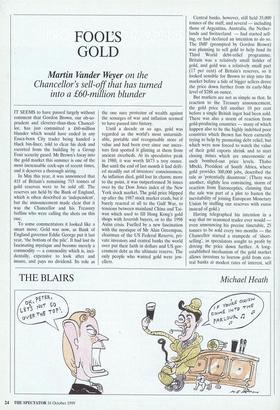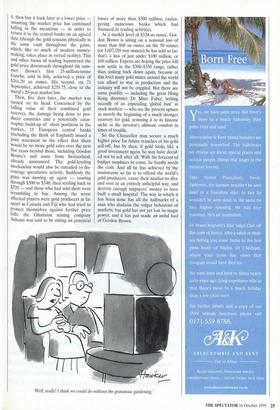FOOLS GOLD
Martin Vander Weyer on the Chancellor's sell-off that has turned into a f60-million blunder
IT SEEMS to have passed largely without comment that Gordon Brown, our oh-so- prudent and cleverer-than-thou Chancel- lor, has just committed a f60-million blunder which would have ended in any Essex-born City trader being handed a black bin-liner, told to clear his desk and escorted from the building by a Group Four security guard. Mr Brown's foray into the gold market this summer is one of the most inexcusable cock-ups of recent times, and it deserves a thorough airing.
In May this year, it was announced that 415 of Britain's remaining 715 tonnes of gold reserves were to be sold off. The reserves are held by the Bank of England, which is often described as 'independent', but the announcement made clear that it was the Chancellor and his Treasury boffins who were calling the shots on this one.
To some commentators it looked like a smart move. Gold was now, as Bank of England governor Eddie George put it last year, 'the bottom of the pile'. It had lost its fascinating mystique and become merely a commodity — a commodity which is, inci- dentally, expensive to look after and insure, and pays no dividend. Its role as the one sure protector of wealth against the scourges of war and inflation seemed to have passed into history.
Until a decade or so ago, gold was regarded as the world's most untamish- able, portable and recognisable store of value and had been ever since our ances- tors first spotted it glinting at them from ancient riverbeds. At its speculative peak in 1980, it was worth $873 a troy ounce. But until the end of last month it had drift- ed steadily out of investors' consciousness. As inflation died, gold lost its charm; more to the point, it was outperformed 36 times over by the Dow Jones index of the New York stock market. The gold price blipped up after the 1987 stock market crash, but it barely reacted at all to the Gulf War, to tensions between mainland China and Tai- wan which used to fill Hong Kong's gold shops with feverish buyers, or to the 1998 Asian crisis. Fuelled by a new fascination with the mystique of Mr Alan Greenspan, chairman of the US Federal Reserve, pri- vate investors and central banks the world over put their faith in dollars and US gov- ernment debt as the ultimate reserve. The only people who wanted gold were jew- ellers.
Central banks, however, still held 35,000 tonnes of the stuff, and several — including those of Argentina, Australia, the Nether- lands and Switzerland — had started sell- ing, or had declared an intention to do so. The IMF (prompted by Gordon Brown) was planning to sell gold to help fund its Third World debt-relief programme. Britain was a relatively small holder of gold, and gold was a relatively small part (17 per cent) of Britain's reserves, so it looked sensible for Brown to step into the market before a tide of bigger sellers drove the price down further from its early-May level of $288 an ounce.
But markets are not as simple as that. In reaction to the Treasury announcement, the gold price fell another 10 per cent before a single British ingot had been sold. There was also a storm of reaction from gold-producing countries — many of which happen also to be the highly indebted poor countries which Brown has been earnestly trying to help by promoting debt relief, but which were now forced to watch the value of their gold exports shrink and to start closing mines which are uneconomic at such bombed-out price levels. Thabo Mbeki, President of South Africa, where gold provides 300,000 jobs, described the sale as 'potentially disastrous'. (There was another, slightly less convincing, storm of reaction from Eurosceptics, claiming that the sale was part of a plot to hasten the inevitability of joining European Monetary Union by stuffing our reserves with euros instead of gold.) Having telegraphed his intention in a way that no seasoned trader ever would — even announcing his precise timetable, 25 tonnes to be sold every two months — the Chancellor started a stampede of 'short- selling', as speculators sought to profit by driving the price down further. A long- established mechanism of the gold market allows investors to borrow gold from cen- tral banks at modest rates of interest, sell it, then buy it back later at a lower price — assuming the market price has continued falling in the meantime — in order to return it to the central banks on an agreed date (though the gold remains physically in the same vault throughout the game, Which, like so much of modern money- making, takes place in virtual reality). This and other forms of trading hammered the gold price downwards throughout the sum- mer: Brown's first 25-million-tonne tranche, sold in July, achieved a price of $261.20 an ounce. His second, on 21 September, achieved $255.75, close to the metal's 20-year market low.
Then, five days later, the market was turned on its head. Concerned by the falling value of their combined gold reserves, the damage being done to pro- ducer countries and a potentially catas- trophic build-up of short positions in the market, 15 European central banks (including the Bank of England) issued a Joint statement to the effect that there Would be no more gold sales over the next five years beyond those, including Gordon Brown's and some from Switzerland, already announced. The gold-lending mechanism would also be curtailed to dis- courage speculative activity. Suddenly the Price was moving up again — roaring through $300 to $340, then settling back to $320 — and those who had sold short were scrambling to buy. Among the worst affected players were gold producers as far apart as Canada and Fiji who had tried to Protect themselves against further price falls: the Ghanaian mining company Ashanti was said to be sitting on potential losses of more than $500 million, endan- gering numerous banks which had financed its trading activities.
At a market level of $320 an ounce, Gor- don Brown is sitting on a notional loss of more than $60 an ounce on the 50 tonnes (or 1,607,550 troy ounces) he has sold so far: that's a loss of just under $100 million, or /60 million. Experts are hoping the price will now settle in the $300-$350 range, rather than sinking back down again, because at this level many gold mines around the world can afford to stay in production and the industry will not be crippled. But there are some pundits — including the great Hong Kong doomster Dr Marc Faber, writing recently of an impending 'global bust' in stock markets — who see the present upturn as merely the beginning of a much stronger recovery for gold, restoring it to its historic niche as the investor's ultimate comfort in times of trouble.
So the Chancellor may secure a much higher price for future tranches of his gold sell-off, but by then, if gold looks like a good investment again, he may have decid- ed not to sell after all. With his forecast of budget surpluses to come, he hardly needs the cash. And all he has achieved by the manoeuvre so far is to offend the world's gold producers, cause their market to dive and soar in an entirely unhelpful way, and destroy enough taxpayers' money to have built a small hospital. The way in which it has been done has all the hallmarks of a man who disdains the vulgar behaviour of markets; but gold has not yet lost its magic power, and it has just made an awful fool of Gordon Brown.
'Well, really! think we could do without the gratuitous gardening.'



















































































 Previous page
Previous page